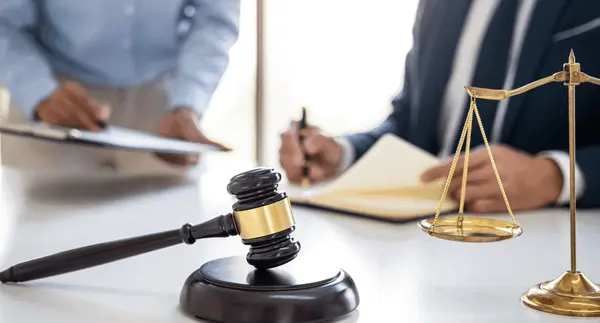
Gerry McMahon is an acknowledged national expert in People Management. He has over 35 years’ experience - as a workplace investigator (on bullying/harassment/ disciplinary/dismissal/grievance issues), trainer, negotiator, facilitator, mediator, arbitrator and team builder - across a wide range of employment sectors. He is the M.D. of the H.R. training and advisory company Productive Personnel Ltd.
Gerry has also had an extensive range of books and articles published and been a columnist with the Industrial Relations News, Irish Times, Sunday Business Post, and Irish Independent and expert commentator on H.R./Employee Relations for R.T.E. and TV3/Virgin. He has also served on numerous Legal Island and C.I.P.D. judging panels and is a Council member of the Irish Association for Industrial Relations.
Contact: Tel. 087-2471415; E-Mail: ppl1gerry@gmail.com
One could be forgiven for thinking that after a (then) record WRC award of €329,000 in 2022 – despite the respondent employer claiming to have ‘conducted a scrupulously fair investigation’ (ADJ-00027573) – that the lesson had been learned. That is, it is of the utmost importance that proper procedure be applied to the conduct of workplace investigations
Investigations and Third Party Judgements
However, subsequent third-party judgements clearly indicate that this is not the case. For example, only last August the Labour Court ruled that deficiencies in a circular issued by the Department of Education to school management teams resulted in breaches of procedure that rendered a teacher’s dismissal unfair. In this instance, the school principal was both the source of the complaint and the chief witness, giving rise to a breach of a natural justice principle, that one cannot be a judge in their own cause (UDD2330).
Coincidentally, last year the Labour Court ordered a Gaelscoil to re-engage a Principal, as the relevant investigation was deemed (amongst other shortcomings) to be ‘a rush to judgment’ (2022/178/MCA). At around the same time, it was reported that the WRC had held against a respondent on the grounds of unfair dismissal, as the complainant ‘was entitled to an appropriate independent investigation’ (ADJ-00039331).
In the following month, it was announced that An Post must pay an operative over €53k. for the effects of sexual harassment, as a WRC adjudicator found that their investigation fell ‘very short of what is set out in the Code of Practice’, as the person who first investigated the complaint ‘took it upon himself to do so’, did not interview the complainant – or anyone else – in the initial investigation, and then attended the complainant’s appeal meeting (ADJ-00040021).
This decision was announced shortly after a Londis supermarket was directed to pay compensation, when warned by the WRC that an investigation is a ‘vital step’ in establishing whether substantial grounds exist to justify a dismissal (ADJ-00036018). At the same Britvic Ltd. was instructed by the WRC to reengage an (unfairly dismissed) employee. In this instance, it transpired that they had refused to show the complainant a selection of statements made by a key witness in the investigation (ADJ-00035538).
Another acknowledged principle of natural justice featured shortly afterward when the WRC held that Lidl Ireland failed to act reasonably when it dismissed an employee for consuming and distributing yoghurt drinks that were due to be written off, as the employer’s gross misconduct verdict was ‘not an appropriate and proportionate response in the circumstances’ (ADJ-00035839).
And only last September it was revealed that a health care provider had to pay €20k. to a senior clinical psychologist, as the WRC decided that there were errors and shortcomings in the complaint investigation. In this case, the adjudicator recommended that, in future, the employer ensure that anyone named in a complaint be informed of the allegation and be given an opportunity to respond before that investigation is finalised (ADJ-00020745).
Just last November the WRC awarded over €10k to a complainant, as the investigation was adjudged to be ‘little more than a fishing expedition’ (ADJ-00044186), whilst as recently as last February, it was reported that the WRC had awarded €20k against a security company for an unfair dismissal, as there had been no investigation whatsoever of the matter in contention (ADJ-00032287).
Codes of Practice and Proper Procedure
Given these (and many other equivalent) third-party judgements, the importance of procedure and natural justice considerations to workplace investigations is well-established. This requirement is rooted in the common law concept of natural justice and the provisions of the Irish Constitution. Accordingly, for the purpose of ensuring ‘natural justice and fair procedures’ in disciplinary scenarios, it is appropriate to apply the practices specified in the Order issued under the Industrial Relations Act 1990 (i.e. the Code of Practice on Grievance and Disciplinary Procedures). It states that:
‘Procedures are necessary … the maintenance of a good industrial relations atmosphere in the workplace requires that acceptable fair procedures are in place and observed. The procedures for dealing with such issues .. must comply with the general principles of natural justice and fair procedures’.
The Code also specifies that in-house procedures should ensure that the:
- details of any allegations or complaints are put to the employee concerned;
- employee concerned is given the opportunity to respond fully to any such allegations or complaints;
- employee concerned is given the opportunity to avail of the right to be represented during the procedure;
- employee concerned has the right to a fair and impartial determination of the issues concerned, taking into account any representations made by, or on behalf of, the employee and any other relevant or appropriate evidence, factors, circumstances.
Under the same Act, the Code on Bullying specifies that: ‘a person or persons alleged to have bullied will be afforded natural justice and treated with fairness ..’. Likewise, the Code on Harassment warns that: ‘it is essential that the principles of natural justice be adhered to’, whilst noting that ‘those carrying out the investigation should not be connected with the allegation in any way’.
This Code also states that an accused party should:
- know what the formal procedure entails and the relevant timeframe;
- have the right to be accompanied and/or represented;
- know the complaint (i.e. be given full details)
- be given time to consider the evidence and an opportunity to respond;
- know that confidentiality will be maintained throughout an investigation to the greatest extent consistent with the requirements of fairness;
- know that a written record will be kept of all meetings and inquiries;
- know that the investigation will produce a written report to both parties outlining its findings and the reasons for its final decision;
- know that if the investigation concludes that the accused employee has a case to answer, then the report will recommend whether the organisation’s disciplinary procedure should be invoked;
- know that a right of appeal exists for both parties and the time limits and procedures involved.
It is noteworthy that a failure to observe a Code’s provisions is admissible in evidence in legal proceedings.
Witness Examination
As detailed above, a key principle of natural justice is that the respondent (or accused) party can avail of the opportunity: (i) to know what a witness or witnesses are alleging/saying and (ii) to question it. For example, the Irish Trade Union Federation’s Guide points out that: ‘.. the source of the allegations or complaint be given or that the employee concerned be allowed to confront or question witnesses’. These issues are also addressed by Geaney Solicitors, who advise that:
‘The main requirements of natural justice that must be met in every case are adequate notice and information to be provided, a fair hearing with a right to reply, no bias by the decision makers and the right to appeal. It is paramount that these basic considerations are applied in all cases … The accused should also be given the opportunity to … cross-examine any of the other witnesses or accusers’.
The Irish Employment Rights Advice source reiterates many of these points, emphasising the entitlements of an accused party, as:
‘The most common reason for unfair dismissal awards arises from failure to follow the rules of fair procedures and natural justice. It is a requirement that complaints or allegations are made in writing and the source of the disputed action be made known to the employee in sufficient time to allow the accused to prepare for the disciplinary meeting. The seriousness of the meeting must be brought to the attention of the employee concerned. The accused employee must then be afforded an opportunity to challenge and question witnesses …’.
This matter of witness evidence and the examination thereof is also addressed by the Bar of Ireland, which explains that: ‘One of the main rules of cross-examination is the requirement to put one’s case to a witness for them to comment on. If this is not done, then the point cannot be relied upon in submissions’. The same source also points out that whilst there was once a doubt about whether this rule existed in Irish law: ‘the Supreme Court has confirmed it does’ (see McNamee v Revenue Commissioners [2016] IESC 33, McDonagh v Sunday Newspapers Limited [2018] 2 IR 79). It also notes that in 2020 the Court of Appeal held that: ‘The aim of cross-examination is to challenge a witness’s evidence by putting matters to the witness in an effort to undermine the direct testimony or to demonstrate unreliability and to seek to elicit evidence favourable to the accused’ (DPP V PR (2020) IECA 68). The importance of this provision (to cross-examine) is also emphasised by the Trinity College Law Review, which states that cross-examination ‘may be the ultimate deciding factor of a judgement’.
A similar warning has been issued by Crushell and Co. solicitors, that: ‘to deny an employee the right to cross-examine a witness during a workplace investigation may amount to a breach of due process and fair procedure’. However, on this point, the same source also acknowledges that the failure to allow one to cross-examine witnesses was considered by the High Court in 2008, when it held that: ‘The important point is that the decision-maker must not act in such a way as to imperil a fair hearing or a fair result .. the factual dispute which the investigation identified .. did not indicate that it was necessary in the interest of fairness to afford such opportunity’ (IEHC 332).
In applying this provision, Reddy Charlton’s Laura Graham’s assessment is notable. She also points out that: ‘an accused employee should always be given the opportunity to challenge the evidence against him or her’, but explains that: ‘The manner in which this may be carried out is still unclear’. Clarifying the matter, Byrne Wallace solicitors - drawing upon precedent from the superior courts - offer good guidance, advising that there are: ‘.. some circumstances in which an accused employee would be entitled to cross-examine witnesses, but the right to cross-examine did not exist in every case and could (be) circumvented if alternative means could be established by which the accused person can challenge the evidence against them. For example, if questions could be put through the chair of an investigation panel, this could obviate the need for cross-examination by the accused person of his or her representative’.
Complications
Serving to complicate matters somewhat, it is apparent that the requirements of procedural justice vary, depending on the particular circumstances of each case. The precise nature of what is required - insofar as fair procedures and natural justice are concerned - varies from case to case. What is (procedurally) required in any given case depends on the facts of that case. For example, this was evident in the Mooney v An Post (1998 4 IR 288 SC) case, where the Supreme Court held that the claimant was not entitled to an oral hearing or an implied right to remain silent. This complex matter of procedural entitlements also featured in the Shortt v Royal Liver Assurance Ltd. (IEHC 332) case in 2008, when the plaintiff alleged a breach of fair procedures, as he wasn’t given the right to cross-examine or test the evidence against him. The court determined that though the conduct of the disciplinary process had not been perfect, the imperfections were ‘not likely to imperil a fair hearing or a fair result’. The matter also featured subsequently in the High Court’s Fanning v Commissioner of An Garda Siochana case (IEHC 58), where it was held that: ‘… the disciplinary policy in question was clearly a guide and not a piece of disciplinary legislation … the subject matter of the within proceedings is not a criminal trial but an internal enquiry. Such enquiries may proceed on a less formal basis and the Court should look at the enquiry in the round in assessing whether fair procedures were followed’. In summary, it is clear that case context is everything and that the facts of each inquiry govern the extent to which proper procedure and natural justice entitlements apply to an investigative process.
Key Message
The key message is that a full formal workplace investigation is frequently a complex, contentious, consequential and resource-consuming process, that should not be undertaken lightly. Given the aforementioned considerations, workplace investigators should proceed with caution, keeping a keen eye on proper procedure, natural justice, relevant statute law(s), the applicable Code of Practice, in-house policy and case precedent. That is, in one’s capacity as an investigator, when confronted with an issue of potential legal consequence, it is important to ensure that one’s approach doesn’t serve to make matters worse.
Continue reading
We help hundreds of people like you understand how the latest changes in employment law impact your business.
Please log in to view the full article.
What you'll get:
- Help understand the ramifications of each important case from NI, GB and Europe
- Ensure your organisation's policies and procedures are fully compliant with NI law
- 24/7 access to all the content in the Legal Island Vault for research case law and HR issues
- Receive free preliminary advice on workplace issues from the employment team
Already a subscriber? Log in now or start a free trial


